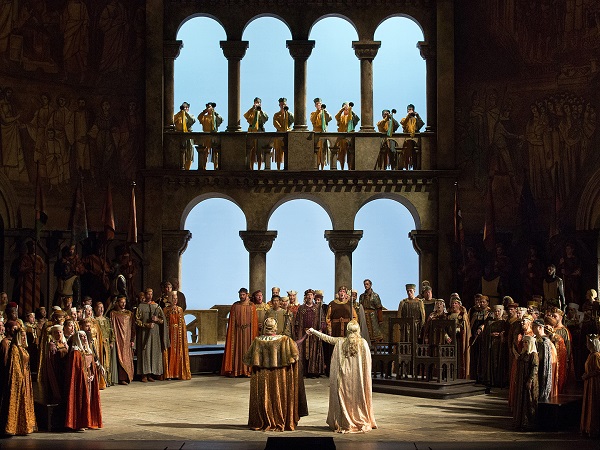 I felt the need of a coffee at FACT before five hours of Wagner. I mean, what's the chances I'm going to fall asleep like I did in Otello? There are two intervals. LOL
I felt the need of a coffee at FACT before five hours of Wagner. I mean, what's the chances I'm going to fall asleep like I did in Otello? There are two intervals. LOL
There are very many situations in which the arts can be appreciated.
These are the ones that I have sampled this month.
Opera House
 I felt the need of a coffee at FACT before five hours of Wagner. I mean, what's the chances I'm going to fall asleep like I did in Otello? There are two intervals. LOL
I felt the need of a coffee at FACT before five hours of Wagner. I mean, what's the chances I'm going to fall asleep like I did in Otello? There are two intervals. LOL
This production of Tannhäuser was created by Otto Schenk and Günther Schneider-Siemssen in the grand style and it worked very well indeed. James Levine conducted in the grand style as well. If this what want for your Wagner, then this is about as good as it will get.
Johan Botha's Tannhäuser is a miracle of stamina and steady unforced tone. He was well matched by Michelle DeYoung's Venus and Eva-Maria Westbroek's Elisabeth. Peter Mattei was maybe a shade underpowered for Wolfram but his rendition of O, du mein holder Abendstern was a sweetly sung and heart-felt prayer.
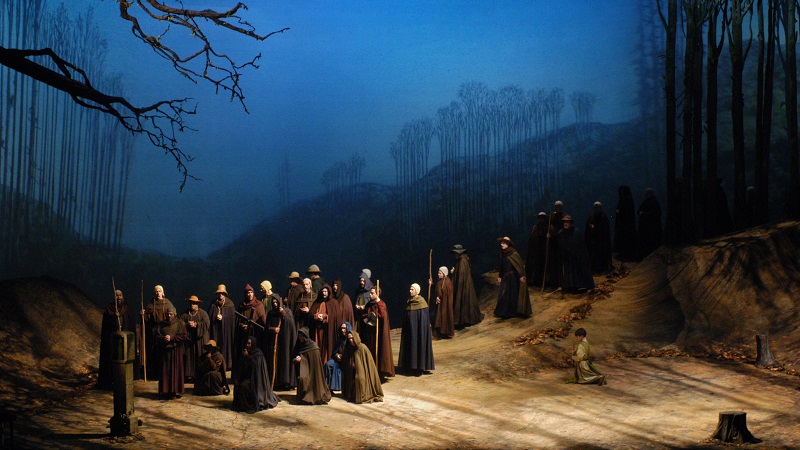
Cinema
Ross and I went off to the local Odeon to see Spectre with high hopes and we were not disappointed.
From that first endless tracking shot during Day of the Dead celebrations in Mexico City to the helicopter crash on Westminster Bridge at the end, we were strapped into the roller-coaster carriage and happy to go along for the ride.
Mind you, I have to say that, when M told his political boss C that at least we now knew what C stood for, "careless" wasn't the first word that sprang to my mind.
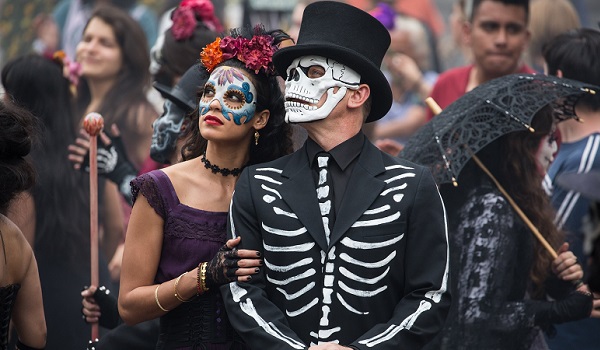
 Ross and I sat down and watched Minions.
Ross and I sat down and watched Minions.
Any film that can have you laughing out loud during the opening credits is well worth £10 for the DVD.
And I was still laughing through the closing credits as well.
Library
 After The Bone Clocks, David Mitchell has added more detail to his multi-layered meta-narrative with Slade House.
After The Bone Clocks, David Mitchell has added more detail to his multi-layered meta-narrative with Slade House.
Although it links with many of Mitchell's preceding novels, the work stands on its own with the strange location of Slade House, physically appearing and disappearing at nine year intervals, being the setting for an ongoing battle between Anchorites (who feed off human souls to maintain a sort of immortality) and Horologists, who are on a seek and destroy mission through time and space.
I'll go back to it again and again. And I can't wait for his next novel.
 Last year, I read the first two Cormoran Strike novels by JK Rowling writing under the pseudonym of Robert Galbraith. The latest is Career of Evil.
Last year, I read the first two Cormoran Strike novels by JK Rowling writing under the pseudonym of Robert Galbraith. The latest is Career of Evil.
I'm sure that there will be a fourth, fifth and sixth. I'm just not that inclined to go on the journey.
Concert Hall
 It's useless to pretend that Schumann's Violin Concerto is one of his best pieces but, when you have an advocate as committed as Isabelle Faust, then at least the work is given a good chance. There are some lovely, delicate passages but the only section which really took off was the Polonaise style finale which conductor and soloist treated, quite appropriately, as a lively dance.
It's useless to pretend that Schumann's Violin Concerto is one of his best pieces but, when you have an advocate as committed as Isabelle Faust, then at least the work is given a good chance. There are some lovely, delicate passages but the only section which really took off was the Polonaise style finale which conductor and soloist treated, quite appropriately, as a lively dance.
The second half of the concert contained Mahler 6 which was just thrilling. I could have done without the mock pantomime of the percussionist ascending to the top of the choir to deal two hammer blows and then deciding against a third with a weary shake of his head. It's all in the music without such nonsense. Vassily Petrenko now has a well drilled orchestra at his command and the taut rhythms, snarky woodwinds, baleful brass and whiplash changes of mood that have been so characteristic of their work together on Shostakovich have also given them all a real heads up for Mahler. This was savage, doom-laden music making.
Television
 I've been really excited waiting for the start of Series 3 of The Bridge.
I've been really excited waiting for the start of Series 3 of The Bridge.
After the end of last season, Martin is gone - into prison - and Saga has a new male companion in Henrik who has a back story of lost children.
None of this is going to end well.
Still, I love Saga.
Art Gallery
 Ross's parents came over to visit us. I'm not sure why we chose to go to Tate Liverpool but we did. I suspect that the exhibition entitled Works to Know by Heart: An Imagined Museum sounded much better at the design stage than it eventually looked.
Ross's parents came over to visit us. I'm not sure why we chose to go to Tate Liverpool but we did. I suspect that the exhibition entitled Works to Know by Heart: An Imagined Museum sounded much better at the design stage than it eventually looked.
The idea was that, sometime in the future, art on display will disappear forever and the only way to keep it available will be to commit it to memory. Tate Liverpool, Centre Pompidou in Paris and Frankfurt am Main's Museum für moderne Kunst (MMK) pooled works from their post 1945 collections to offer a selection.
 If the exhibition was trying to encourage audiences to take on an active role forming a personal relationships with the artworks, then it failed as few works really felt good enough to require saving.
If the exhibition was trying to encourage audiences to take on an active role forming a personal relationships with the artworks, then it failed as few works really felt good enough to require saving.
Claes Oldenburg's Soft Typewriter (above) was at least fun but, for example, I couldn't find enough merit in Joseph Kosuth's Clock (One and Five) to require me to memorise it so that future generations had something to appreciate.
 Rachel Whiteread's Bath - a black resin cast of an ordinary bath thus showing an impression of the underside of the object - did at least feel like a statement and called up all sorts of images of sarcophagi for dead potentates. And the offset reverse image of things has long been a stock in trade of the artist.
Rachel Whiteread's Bath - a black resin cast of an ordinary bath thus showing an impression of the underside of the object - did at least feel like a statement and called up all sorts of images of sarcophagi for dead potentates. And the offset reverse image of things has long been a stock in trade of the artist.
However, I just didn't feel that this was the best example of her work and, if her œuvre were going to be preserved for the future, then another example should have been chosen.
 And yes, Marcel Duchamp probably requires some sort of note in the art history text books of the future with his Nude Descending a Staircase, No2, The Bride Stripped Bare by Her Bachelors, Even and the inevitable urinal, a piece whimsically entitled Fountain, but those works were all pre-1950 and Fresh Window, which was what was on show, is pretty lame by comparison.
And yes, Marcel Duchamp probably requires some sort of note in the art history text books of the future with his Nude Descending a Staircase, No2, The Bride Stripped Bare by Her Bachelors, Even and the inevitable urinal, a piece whimsically entitled Fountain, but those works were all pre-1950 and Fresh Window, which was what was on show, is pretty lame by comparison.
 The one piece of work which sort of got me going was by someone who I had never heard of before - Dorothea Tanning. She worked across many different media, lived for over 100 years, married Max Ernst, involved herself in the cultural life of Europe and the USA and was probably more influential than renowned. What we were given was an installation entitled Poppy Hotel, Room 202.
The one piece of work which sort of got me going was by someone who I had never heard of before - Dorothea Tanning. She worked across many different media, lived for over 100 years, married Max Ernst, involved herself in the cultural life of Europe and the USA and was probably more influential than renowned. What we were given was an installation entitled Poppy Hotel, Room 202.
This theatrical setting replicates a seedy Parisian hotel room with strange soft sculptures made of fabric and resembling disjointed body parts which erupt out of the walls and drape themselves over furniture and objects. The effect is disconcerting and feels not unlike a scene out of an early David Lynch movie.
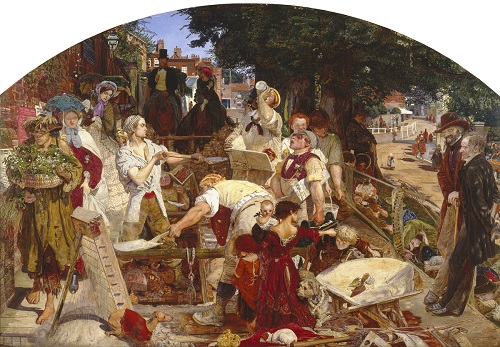 I took myself over to Manchester for the day and decided to visit the Manchester Art Gallery as I cannot remember ever having been in the building previously. My overall initial impression is of a limited but interesting collection hung in the most confusing and haphazard manner.
I took myself over to Manchester for the day and decided to visit the Manchester Art Gallery as I cannot remember ever having been in the building previously. My overall initial impression is of a limited but interesting collection hung in the most confusing and haphazard manner.
There is a great strength in the Pre-Raphaelite collection. I like Ford Maddox Brown's work and there are many more examples here than we have in Liverpool. Work (see to the right) is a masterly example of composition and a delightful combination of contemporary social observations.
 The collection also includes a broad spectrum of British/English Art from across the Nineteenth Century - Turner, Stubbs, Constable, etc.
The collection also includes a broad spectrum of British/English Art from across the Nineteenth Century - Turner, Stubbs, Constable, etc.
I did enjoy the depiction of the cheetah and the stag with the two Indian keepers.
As with most of Stubbs's work there is a history of patronage, ownership and the desire for self-promotion behind the work.
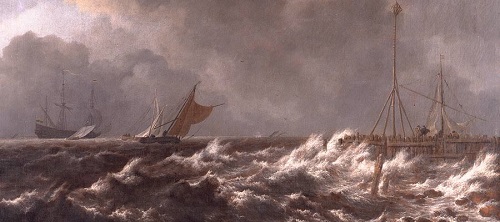 The Gallery also houses a special bequest of Seventeenth Century Dutch Art.
The Gallery also houses a special bequest of Seventeenth Century Dutch Art.
Whilst none of the named artists were familiar to me, I'm told that many are well known amongst connoisseurs.
Jacob Van Ruisdael (featured to the right) is apparently widely known for his landscapes which is why this seascape is quite unusual.
Landscapes, seascapes, portraits and still lives feature heavily from the Golden Age of Dutch mercantile activity which resulted in the setting up of the Dutch East India Company, the creation of double entry bookkeeping and the idea of the National Debt - ideas which the British took on after the Glorious Revolution and made themselves a world Empire.
Bedroom
 I think that sex is also an art rather than a craft and the bedroom in question here was in a central Manchester boutique Hotel. Alex, who I met back in early October, had been gifted the room by a client for a week. The gift came with obligations, of course, and, when I arrived at the hotel, Alex had only just finished being porked rotten by the client leaving him in a tender and tenderised state.
I think that sex is also an art rather than a craft and the bedroom in question here was in a central Manchester boutique Hotel. Alex, who I met back in early October, had been gifted the room by a client for a week. The gift came with obligations, of course, and, when I arrived at the hotel, Alex had only just finished being porked rotten by the client leaving him in a tender and tenderised state.
Luckily, I had arranged for us to be joined by Damien, who I was reacquainted with back in mid October. Damien quickly took to the bottoming role and was rewarded with a thorough seeing to by Alex. In fact, Alex and I took turns. Damien needed respite breaks but was very game in the circumstances.
Fun afternoon.